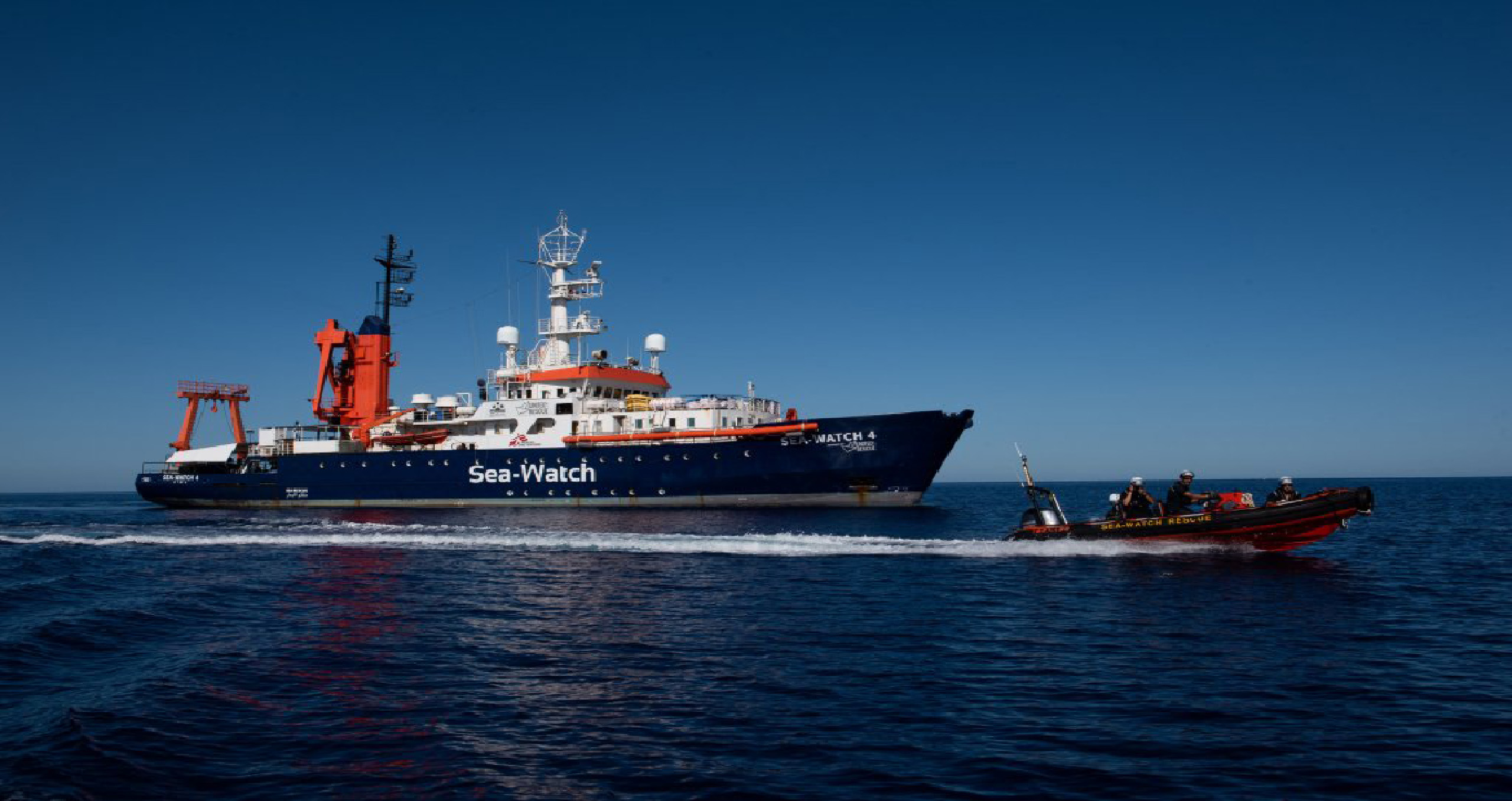The Aegean Crisis

The Sea-Watch 4 set sail in the Mediterranean. Photographer: Chris Grodotski (Infomigrants, 2020).
The Aegean Crisis: Interview with Jacob Warn from Action for Education
Europe’s criminalization of NGO refugee rescuers reaches ‘new peak’ after fifth ship detained in Italy. Background: After spending the majority of September and October detained in the port of Palermo, Sicily, the Non-Governmental Organization (NGO) ship, Sea Watch 4, has been able to continue its mission, rescuing asylum seekers from Libya, Afghanistan, Syria, and North Africa crossing the Aegean Sea. After being unable to dock for 48 hours between 22-24th August and having set its 353 rescued migrants ashore, on September 20th, Sea Watch 4 again faced difficulties at the port of Palermo (Bathke, 2020). After an 11-hour inspection by Italian port authorities, the ship was detained for acting outside of the remits of its registration as a General Cargo ship. The Italian authorities also reportedly objected to the number of life jackets on board and that the capacity of the sewage system was insufficient for the number of people aboard the ship (France24, 2020). However, its release is far from a victory. At the time of its detainment, Sea Watch 4 was the fifth civilian rescue ship to be detained by Italian authorities in the previous five months. After the SOS Mediterranee’s ship, Ocean Viking, faced a similar detainment on July 22nd, their director, Frederic Penard, condemned how “the same argument over safety has been systematically used by Italian authorities” to impede the NGO activity in the Aegean (SOS Mediterranee, 2020). Similarly, Philipp Hahn, head of operations on the Sea-Watch 4, has commented on the use of “flimsy excuses” (Deutsche Welle, 2020) and Ellen van der Velden, the Search and Rescue Operational Manager for Médicins Sans Frontières, stated, “We are accused of ‘systematically’ saving people, criticised for having too many life jackets on board and scrutinised over the sewage system…Meanwhile, the obligation for every ship to provide assistance to boats in distress is completely disregarded” (Médicins Sans Frontières, 2020). This is not the only accusation of unlawful behavior occurring within the Mediterranean. Directly neglecting the principal of non-refoulement (a fundamental international law that forbids a country receiving asylum seekers from returning them to a country in which they would be in likely danger of persecution), Patrick Kingsley, journalist for the New York Times, revealed that Greece has expelled more than 1000 asylum seekers in secret, leaving many on inflatable life rafts to drift in the Aegean Sea (2020). Rather than condemning the behavior, addresses, such as one made by the president of the European Commission, Ursula von der Leyen, during the Greece-Turkey border crisis in March, saying “I thank Greece for being our European aspida (shield) in these times,” only serves to justify Greece’s behavior, as it protects the European Union’s interest in using the Greek islands as a buffer against a perceived onslaught on migrants (Trilling, 2020). To gain further insight into why there has been such a strong push-back against migrant rescue ships, I spoke with Jacob Warn from Action for Education about the conditions in the Aegean, both on land and at sea, and discussed why and how NGOs and volunteers are vital in establishing beneficial change to life in these camps. Can you tell me a little about your background as a volunteer and the work of Action for Education? I’ve been volunteering in Greece since January 2017, always on the Aegean islands, which has received a lot of media attention over the years. I first came out as a teacher, really motivated to run music and English classes for children and teenagers. However, being out here means grappling with a lot more than that. After the first 12 months, due to shifting organizations, we ended up establishing a new non-profit, Action for Education, to grow the provision of education on the islands. Since then – early 2018, that is – it’s been quite the journey. We’ve grown our operations ambitiously, expanding first to Athens, then across to other islands in the Aegean, primarily Samos. Running education centers, however, means balancing emergency needs with structured classes. It’s simply not enough to run lessons. Rather, our centers are a hybrid of learning and basic needs: we offer showers, hot meals, sanitary items, and psychosocial support alongside typical classes. During the last few years, my own focus has shifted. I’ve gone from teaching in the classroom, to managing groups of volunteers, to general management of most organizational aspects: fundraising, finance, policy, public relations. These days are intense and varied, but always offer important learning opportunities. From your first-hand experience, can you tell me a little about what conditions asylum seekers often encounter whilst crossing the Aegean (from Turkey)? In what mental and physical condition do these people often arrive at the camps? Those arriving on the islands have undergone a terrible ordeal. Since 2015, boats have arrived from the Turkish coast on a daily basis. Whilst Turkey is clearly visible to the naked eye, the sea in-between is unforgiving. In winter, wind and rain whips across it; in summer, deceptively calm waters still leave boats stranded for hours, as the vessels used are often ill-equipped. I’ve heard countless stories from asylum seekers who tell me how their engine ran out of fuel long before the boat could reach the land; or how they simply got lost in the dead of night. I’ve heard stories from people who have swum miles; who have spent days on small rocky islets between the two countries, waiting for a boat to pass and pick them up. And, increasingly, we hear other kinds of stories: stories of boats being beaten back, even of boats arriving on the island only to be taken back out and pushed into Turkish waters. These furtive, illegal acts contravene humanitarian law and the principle of non-refoulement. For those arriving here, they are most often met by police and transferred to a local police station. If they’re lucky, they’re given a container to stay in, but in most cases, they’re simply handed a blanket and a sleeping bag, and told to find a place to set up a tent. Then, there are the children. Children who are told there’s no possible way they’re under 18 and are given a birth date that categorizes them as an adult. This means less social support and increased vulnerability. Even if you are registered as child, space in the so-called ‘safe zones’ are limited, and many children end up sleeping rough in the ‘jungle’ areas of the camp, prone to exploitation and abuse. Once on land, what further challenges face these asylum seekers in the Greek island camps? Why might governments want to prevent sea-born asylum seekers reaching as far as the camps? Life in the camps is tough. Services are critically limited. Access to lawyers and doctors is rare, and what provision is available is often only offered from independent, non-profit organizations. But it’s often the time duration of the asylum process that takes the greatest toll. Refugees are stuck in these camps for years, and this takes a heavy toll on the community’s mental health. Being left in political limbo, whilst enduring physically exhausting conditions, creates a health crisis that leads to suicide, depression, and violence. We often ask ourselves why such conditions exist. Surely there is an alternative to the policy that creates such widespread and chronic suffering. Yet nothing changes. This is likely because whilst we face a humanitarian crisis, in reality, this is the result of a political crisis. There is quite simply not the political appetite to change this horrible status quo. Why? Some say it’s a deterrent, that perpetuating such conditions sends a message to those wanting to come from Turkey. Others says there’s a financial incentive, that the national government benefits from supporting asylum seekers, receiving huge amounts of EU money, only a fraction of which truly reaches the intended beneficiaries. But it’s certainly also caused by countries across the EU not standing in solidarity with Greece. Without an effective relocation mechanism across Europe, asylum seekers will forever be stuck in an overburdened national asylum system. It’s possibly for this reason that, increasingly, we hear of pushbacks on European borders. Stopping the ‘flow’ is the most effective way of reliving pressure on the islands. Increased patrols by national and European border forces are doing just this. Preventing asylum seekers from reaching the camps means withholding from asylum seekers their right to claim asylum. A strong border – a wall of sea – does just this. Have you encountered any hostility towards, or criminalization of Non-Governmental Organization activity in any camps where you, or Action for Education have implemented aid or organized programs? Back in 2017, NGOs didn’t face much opposition, but increasingly this is an everyday part of our work. Unlike in many countries, where charitable work is seen as a force of good, there has been a demonization of ‘MKOs’ (the Greek translation of NGO) to such an extent that it is often embarrassing or even dangerous to say you work for one. We have seen direct attempts to curtail NGO activities, including the use of extortionate fines to close centers, as well as local leaders defaming NGOs for their work, blaming them for everything from ‘bringing the virus’ to the islands, to destroying the local economy, accusations which are often baseless. On a national level, we have watched this year as the new Greek government has brought in legislation that undermines and threatens the work of small grassroots NGOs. Fighting these legislative changes is being the scope of many of these groups, who don’t have the staff or capacity to develop the exacting mechanisms and procedures demanded of them. These new laws are widely regarded as a blatant attempt to criminalize the work of NGOs, and they have been decried as such by major humanitarian organizations including Médecins Sans Frontières and Human Rights Watch. What are the greatest concerns for refugee camps and NGO rescue ships for the end of 2020 and into 2021? In the Aegean, rescue ships have focused on the island of Lesvos. I, personally, have less experience and understanding of the situation there, but know that individuals have been outrageously targeted and accused of human trafficking. It is widely regarded as dangerous to be involved in any kind of communication with incoming boats, even for the purposes of saving lives, since this is often used as evidence for people smuggling. As we move into the new year, without an independent watchdog to ascertain whether the actions of national and European border agencies are in line with international law, and with Covid-19 lockdowns restricting access to information further, there are growing concerns that human rights violations will continue to occur on this Aegean border. What do you think the future of asylum seeker sea crossings and camp internments will be without supportive EU or governmental intervention? Without strong oversight, it is likely that camps will become ever more closed, access will be further restricted, and the rights of asylum seekers increasingly disregarded. There must be transparency and open access to these systems, not only for the monitoring of governmental action, but also to offer support as needed. The recently announced EU pact on migration, unfortunately, does not go far enough in protecting asylum seekers. There must be stronger mechanisms in place for independent monitoring of governmental and EU border forces, to ensure that refoulement does not occur and that conditions in EU hotspot camps meet, at least, the most basic standards of decency. As NGOs leave the islands, shut down by a government that jeopardizes their operations, the picture of what is happening in the Aegean grows ever darker. A powerful and holistic response, led by an EU commission that upholds human rights, is possibly the only solution at this point.

Article by
Madeleine Sophie Piggott

Categories


